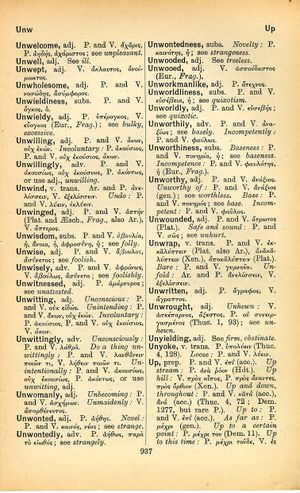up
τά δέ ἄνευ συμπλοκῆς, οἷον ἄνθρωπος, βοῦς, τρέχει, νικᾷ → and the simple forms of speech, for example: 'man', 'ox', 'runs', 'wins'
English > Greek (Woodhouse)
preposition
up stream: P. ἀνὰ ῥόον (Herodotus).
up hill: V. πρὸς αἶπος, P. πρὸς ἄναντες, πρὸς ὄρθιον (Xen.).
up and down, throughout: P. and V. κατά (acc.), ἀνά (acc.) (Thuc. 4, 72; Dem. 1277, but rare P.).
up to a certain point: P. μέχρι του (Dem. 11).
up to this time: P. μέχρι τοῦδε, V. ἐς τόδ' ἡμέρας (Eur., alc. 9), P. and V. δεῦρο (Plato and Eur., Heraclidae 848); see hitherto.
come up with, reach: P. and V. ἐξικνεῖσθαι (gen.); see reach.
overtake: P. ἐπικαταλαμβάνειν; see overtake.
well up in, versed in: P. and V. ἔμπειρος (gen.).
be well up in an author: Ar. and P. πατεῖν (acc.) (Ar., Av. 471 and Plato, Phaedrus 273A).
adverb
P. and V. ἄνω, Ar. and P. ἐπάνω.
up and down: P. and V. ἄνω κάτω, ἄνω τε καὶ κάτω, P. ἄνω καὶ κάτω.
hither and thither: see under thither.
the up country: P. ἡ μεσογεία; see inland.
go up country, v.: P. ἀνέρχεσθαι (Thuc. 8, 50), ἀναβαίνειν.
be up (of time), be passed: P. and V. παρελθεῖν (2nd aor. of παρέρχεσθαι).
go up: P. and V. ἀνέρχεσθαι, Ar. and P. ἀναβαίνειν.
stand up: P. and V. ἀνίστασθαι; see rise.
it is all up with me: use P. and V. οἴχομαι (Plato); see be undone.
shall we say it was all up with these things? P. πάντα ἔρρειν ταῦτα… φήσομεν; (Plato Leges 677C).

